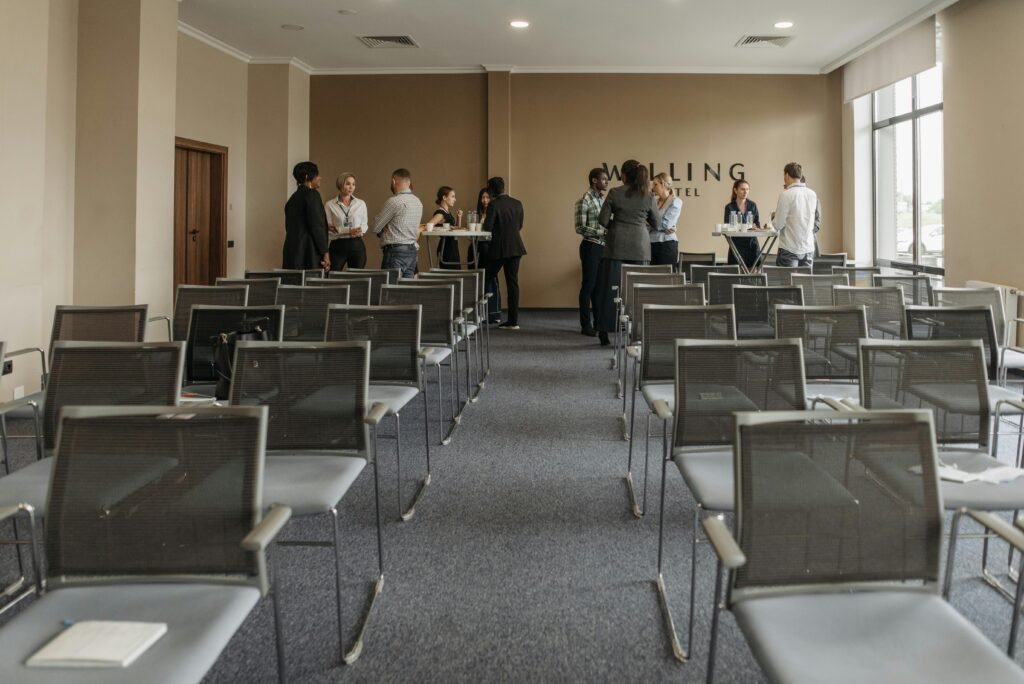
Understanding Personal Adaptability
Thriving in today’s fast-paced world requires more than just technical skills; it demands personal adaptability.
This trait is about more than simply reacting to change—it’s about actively embracing it and using it as a catalyst for personal growth.
Think of personal adaptability as your secret weapon in navigating the ever-evolving landscape of your career.
To understand personal adaptability, consider its core components: flexibility, resilience, and openness to change.
Flexibility involves being willing and able to pivot your approach when new information or circumstances arise.
Resilience is about bouncing back from setbacks and persisting in the face of challenges.
Openness to change means being eager to explore new ways of doing things and stepping outside your comfort zone.
One of the first steps in enhancing personal adaptability is to develop an awareness of your current habits and attitudes toward change.
Do you resist new ideas or are you quick to see the potential in them?
Begin by observing your initial reactions to change.
If you find yourself resisting, take a moment to reflect on why that might be.
Understanding your resistance is the first step toward overcoming it.
It’s also essential to foster a proactive mindset.
Rather than waiting for change to happen, seek out opportunities that challenge you to grow.
This might mean volunteering for new projects, taking on roles that stretch your abilities, or learning skills outside of your current expertise.
By proactively seeking change, you build the mental muscle needed to adapt swiftly and effectively.
Personal adaptability isn’t just about individual efforts; it’s also about leveraging your environment and the people around you.
Create a support network of colleagues, mentors, and friends who can offer diverse perspectives and advice.
These relationships can provide invaluable insights and encouragement, especially when navigating unfamiliar territory.
Remember, personal adaptability is a continuous journey, not a one-time effort.
The more you practice adapting, the more natural it will become.
Start small by making minor changes in your daily routines or taking on low-stakes challenges.
Gradually, these small steps will build up your adaptability muscle, preparing you for larger, more significant changes down the line.
Lastly, embrace the idea that change is not just inevitable but also an opportunity.
Each new situation you encounter is a chance to learn something new and become better at what you do.
With each experience, you build a stronger foundation of adaptability that will serve you well throughout your career.
By cultivating flexibility, resilience, and a proactive mindset, you’ll not only manage change more effectively but also use it to your advantage, ensuring that you remain a valuable and dynamic professional in any industry.
Cultivating a Growth Mindset

Cultivating a growth mindset is essential for boosting personal adaptability.
This concept, introduced by Carol Dweck, revolves around the belief that abilities and intelligence can be developed through dedication and hard work.
People with a growth mindset see challenges as chances to learn, not as barriers.
To start fostering this perspective, pay attention to moments when you feel stuck or frustrated.
Instead of thinking, “I’m just not good at this,” try shifting to, “I need to work on this.”
Embrace setbacks as learning experiences. When you receive feedback, use it as a tool to grow.
This shift in thinking can transform how you approach new tasks and challenges.
One practical way to nurture a growth mindset is by setting learning goals instead of performance goals.
Learning goals focus on the process and improvement, such as “I want to understand this better,” rather than “I need to get an A on this project.”
This approach encourages continual growth and reduces the fear of failure.
Engage in reflective practices to deepen your understanding of how you learn and grow.
After completing a task, ask yourself what worked, what didn’t, and how you can improve next time.
This habit of reflection helps to cement the growth mindset by making learning an active, ongoing process.
Surround yourself with people who also embrace a growth mindset.
Positive influences can bolster your efforts and provide motivation when you encounter obstacles.
Collaborate with those who challenge you to think differently and push you to expand your skills.
This environment of mutual growth fosters adaptability by constantly exposing you to new ideas and methods.
Research by Blackwell, Trzesniewski, and Dweck highlights the impact of this mindset, showing that implicit theories of intelligence, which are foundational to a growth mindset, can predict achievement during transitions, underscoring its significance for adaptability.
This means that developing a growth mindset isn’t just about improving in your current role but also about being better prepared for future changes and challenges.
Another key strategy is to seek out and embrace challenges that stretch your capabilities.
This could involve taking on new projects that are outside your comfort zone or learning new skills that are relevant to your industry.
By consistently pushing your boundaries, you build resilience and adaptability, making you more capable of navigating change.
Finally, cultivate curiosity. A curious mindset drives you to explore, ask questions, and seek out new knowledge.
Continuous Learning and Skill Development

In a rapidly changing industry, staying adaptable means continuously expanding your knowledge and skills.
Engaging in ongoing education helps you remain competitive and ready to handle the shifts and changes that come your way.
According to a meta-analysis by Hattie, Biggs, and Purdie, interventions that focus on learning skills have a significantly positive impact on student learning, highlighting the importance of ongoing education.
First, identify the skills and knowledge that are currently in demand in your industry.
This might involve new technologies, methodologies, or even soft skills like communication and teamwork.
Use online platforms like Coursera, Udemy, or LinkedIn Learning to take relevant courses.
Many of these platforms offer certifications that can enhance your resume and show your commitment to professional development.
Workshops and seminars also offer valuable opportunities for learning.
These events not only provide in-depth training but also allow for networking with other professionals.
Industry conferences can be particularly useful for staying updated on the latest trends and innovations.
Engaging with experts and peers at these events can give you fresh insights and ideas that you can apply in your work.
Don’t overlook the power of on-the-job learning. Volunteer for projects that require skills outside your usual scope.
By taking on challenging tasks, you expose yourself to new learning opportunities and demonstrate your willingness to grow.
This proactive approach not only builds your skillset but also positions you as a versatile and valuable team member.
Another effective strategy is to seek out mentorship.
Learning from someone with more experience can provide you with practical insights and guidance that you might not find in textbooks or online courses.
Mentors can help you navigate your career path, offering advice on skill development and career advancement.
Reading industry-specific books, journals, and articles can also keep you informed about the latest developments in your field.
Set aside time each week to read and absorb new information.
This habit not only broadens your knowledge but also keeps you engaged and curious about your industry.
Lastly, practice what you learn. Theory is important, but application solidifies your knowledge and makes it practical.
Whether it’s a new software tool, a management technique, or a problem-solving strategy, apply what you’ve learned as soon as possible.
This hands-on experience will deepen your understanding and improve your adaptability.
Remember, continuous learning is a mindset.
Approach each day with the goal of learning something new, no matter how small.
This ongoing commitment to self-improvement will help you stay adaptable and ready for whatever changes come your way.
Building Emotional Intelligence

Building emotional intelligence (EI) is a game-changer when it comes to boosting personal adaptability.
It’s not just about understanding your emotions but also about how you navigate the emotions of others.
Let’s break it down into actionable steps that can transform the way you respond to change and interact in dynamic work environments.
First, focus on self-awareness. Knowing what triggers your emotional responses is crucial.
Start by keeping an emotion journal.
Every day, jot down situations that evoke strong feelings and reflect on what caused those emotions.
This practice helps you recognize patterns and identify areas for improvement.
Next, work on self-regulation.
It’s one thing to know what you’re feeling; it’s another to manage those emotions effectively.
Techniques like deep breathing, mindfulness, and taking a moment to pause before reacting can significantly improve your emotional control.
For instance, the next time you feel stressed about an impending deadline, take a few deep breaths and break the task into manageable chunks.
This approach not only calms your nerves but also makes the task seem less daunting.
Empathy is another cornerstone of EI.
It involves putting yourself in someone else’s shoes and understanding their perspective.
Practice active listening in your conversations.
Instead of planning your response while the other person is talking, fully concentrate on their words, tone, and body language.
This will help you respond more thoughtfully and build stronger, more empathetic relationships.
Another important aspect is social skills.
Building strong relationships and managing interactions well can significantly impact your adaptability.
Engage in team activities and be proactive in resolving conflicts.
For example, if a team member seems disengaged, initiate a private conversation to understand their concerns and offer support.
Motivation, another component of EI, is about having an internal drive to improve and achieve.
Set personal and professional goals that challenge you. These goals should be aligned with your values and passions.
For example, if you’re passionate about sustainability, look for projects or roles within your organization that align with this interest.
This intrinsic motivation will make it easier to adapt and persevere through changes.
Don’t underestimate the power of feedback.
Constructive feedback is invaluable for growth.
Seek it actively and use it to refine your emotional responses and behaviors.
When receiving feedback, focus on understanding the perspective of the person giving it, rather than becoming defensive.
Finally, foster a positive work environment.
A positive atmosphere encourages open communication and collaboration, making it easier for everyone to adapt to changes.
Be the person who uplifts others with words of encouragement and acknowledgment of their efforts.
By focusing on these aspects of emotional intelligence, you can significantly improve your ability to adapt and thrive in ever-changing environments.
Enhancing Problem-Solving Abilities

Problem-solving skills are essential for navigating the ever-changing landscape of today’s industries.
The ability to quickly assess situations, pinpoint challenges, and devise effective solutions is a critical component of personal adaptability.
Enhancing these skills will enable you to tackle unexpected obstacles with confidence and creativity.
Start by honing your creative thinking abilities.
Challenge yourself to think outside the box by engaging in exercises that stimulate your imagination.
For instance, set aside time each week for brainstorming sessions where you explore new ways to address common problems.
Use techniques like mind mapping to visualize different approaches and outcomes.
These exercises can help you break free from conventional thinking patterns and inspire innovative solutions.
Collaboration is another powerful tool for enhancing problem-solving skills.
Diverse perspectives often lead to more comprehensive and effective solutions.
Make a habit of seeking input from colleagues, mentors, and even friends outside your industry.
The varied viewpoints can shed light on aspects you might not have considered.
Organize regular team brainstorming sessions where everyone feels encouraged to share their ideas openly.
This collective intelligence can spark creativity and lead to breakthroughs you wouldn’t achieve alone.
Another strategy is to practice breaking down complex problems into smaller, more manageable parts.
This method, often referred to as chunking, makes daunting tasks seem more approachable and easier to solve.
Start by identifying the core issue and then list out the smaller, contributing factors.
Address each smaller issue individually, which can make the overall problem less overwhelming and more solvable.
Developing strong analytical skills is equally important.
Take time to evaluate the possible outcomes of different solutions.
Weigh the pros and cons and consider both short-term and long-term implications.
This approach will help you make more informed decisions and avoid potential pitfalls.
Use tools like SWOT analysis (Strengths, Weaknesses, Opportunities, Threats) to systematically assess your options and their potential impacts.
Don’t underestimate the value of real-world practice.
Seek out challenging projects that require you to apply your problem-solving skills in practical situations.
These experiences not only build your skillset but also boost your confidence in handling complex issues.
The more you practice, the more adept you’ll become at quickly and effectively solving problems.
Lastly, cultivate a mindset of continuous improvement.
Reflect on past problems you’ve solved and consider what you could have done differently.
Learn from both your successes and your mistakes.
This ongoing process of reflection and adjustment will sharpen your problem-solving abilities over time, making you more adaptable and resilient in the face of change.
By consistently working on these strategies, you’ll enhance your ability to solve problems creatively and effectively, ensuring you’re well-prepared to navigate the dynamic challenges of today’s work environments.
Leveraging Networking and Collaboration

Building a robust network and mastering collaboration skills are crucial strategies for enhancing personal adaptability.
In dynamic industries, these skills help you stay ahead by connecting you with diverse perspectives and innovative ideas.
To start, be intentional about expanding your professional network.
Attend industry conferences, seminars, and local meetups to meet people who share your interests and goals.
Don’t just attend—engage.
Ask questions, participate in discussions, and follow up with new contacts.
LinkedIn is also a powerful tool; use it to connect with industry leaders, join relevant groups, and participate in online discussions.
Remember, the goal is to build meaningful relationships, not just to accumulate contacts.
Active collaboration goes hand-in-hand with effective networking.
When you work with others, you’re exposed to new approaches and problem-solving techniques.
Foster an environment of open communication and mutual respect.
Encourage team brainstorming sessions where everyone feels comfortable sharing their ideas.
Diverse perspectives can lead to innovative solutions that you might not have considered on your own.
Leverage these relationships by seeking mentorship and peer support.
A mentor can offer guidance based on their experiences, helping you navigate your career path and develop new skills.
Peer support, on the other hand, provides a platform for sharing insights and resources, making it easier to adapt to changes.
Collaborative projects are another excellent way to enhance your adaptability.
Volunteering for cross-departmental teams or industry collaborations exposes you to different areas of expertise and broadens your knowledge base.
This not only builds your skill set but also makes you a more versatile and valuable team member.
Keep in mind that networking isn’t just about taking—it’s also about giving.
Share your knowledge, offer assistance, and celebrate the successes of others.
This reciprocity builds stronger, more supportive relationships.
Lastly, stay adaptable by being open to feedback and willing to adjust your approach based on what you learn from others.
Constructive criticism from your network can provide valuable insights and help you grow.
By actively building your network and honing your collaboration skills, you position yourself to thrive in any industry.
The relationships and knowledge you gain will serve as a strong foundation, helping you navigate and adapt to the ever-changing landscape of your career.
